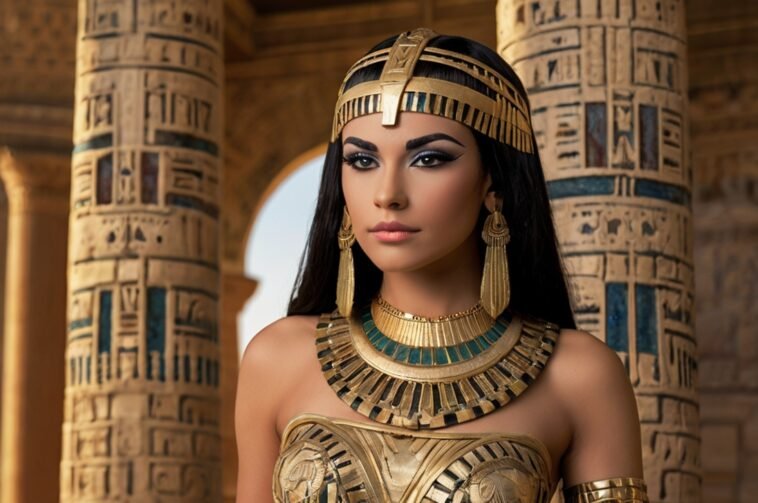
Cleopatra VII, the last active ruler of the Ptolemaic Kingdom of Egypt, has long been a subject of fascination.
Her intelligence, political acumen, and legendary beauty have inspired countless depictions in literature, film, and art.
However, one aspect of her identity remains widely misunderstood—her ethnicity.
Many assume Cleopatra was ethnically Egyptian, but historical evidence paints a different picture.
In this article, we will separate myth from fact and explore Cleopatra’s true heritage.
The Myth: Cleopatra as “Egyptian”
The popular portrayal of Cleopatra as a native Egyptian is largely a result of cultural interpretations rather than historical accuracy.
Over centuries, Cleopatra became synonymous with Egyptian identity, largely due to her rule over Egypt and her association with symbols of Egyptian royalty.
Hollywood and modern media have further perpetuated this image, often depicting Cleopatra with traditionally Egyptian features.
This perception is understandable—after all, she was the queen of Egypt, spoke the Egyptian language, and embraced the country’s customs.
However, being the ruler of Egypt does not necessarily mean she was ethnically Egyptian.
- Read also: Cleopatra vs Nefertiti: A Look at Two Iconic Egyptian Queens
- Read also: How Did Cleopatra Die? Facts Behind Cleopatra’s Death

The Reality: Cleopatra’s Macedonian Greek Heritage
Cleopatra was a descendant of the Ptolemaic dynasty, a Greek ruling family established by Ptolemy I Soter, one of Alexander the Great’s generals.
Ptolemy took control of Egypt after Alexander’s death in 323 BCE, and his descendants ruled the kingdom for nearly 300 years.
The Ptolemies were of Macedonian Greek origin and followed a strict tradition of marrying within their own family to maintain their lineage.
In fact, Cleopatra’s ancestors engaged in sibling marriages, a common practice among the Ptolemies to preserve their Greek heritage.
Unlike many of her predecessors, Cleopatra was unique in that she embraced Egyptian culture, including religious traditions and language.
According to The Cambridge Ancient History (Vol. IX, 1994), she was the first Ptolemaic ruler to actually learn the Egyptian language, a decision that helped her solidify her position with the native population.
However, her genetic background remained Greek.
Evidence and Sources
While Cleopatra ruled Egypt as its queen, multiple historical sources confirm her family origins were distinctly Greek.
Here’s what we know from credible evidence:
Ptolemaic genealogy
Ancient historians like Polybius and Plutarch clearly document Cleopatra’s ancestry:
- She was a direct descendant of Ptolemy I, one of Alexander the Great’s Macedonian generals
- Her family tree shows 12 generations of Greek rulers before her birth
- The Ptolemies saw themselves as Greek rulers maintaining control of a foreign land
Marriage practices
The Ptolemaic dynasty had unusual marriage traditions that preserved their Greek heritage:
- They almost exclusively married siblings or cousins (Cleopatra herself married two brothers)
- Contemporary accounts in the Journal of Hellenic Studies confirm they avoided mixing with Egyptian nobility
- This inbreeding caused health issues but maintained their Macedonian bloodline
Artistic depictions
Surviving portraits tell an important story:
- Coins minted during her reign show classical Greek facial features
- Busts depict her with the wavy hair and prominent nose common in Hellenistic art
- These differ significantly from traditional Egyptian depictions of royalty
DNA analysis possibilities
While we don’t have Cleopatra’s DNA:
- Studies of Ptolemaic-era remains (like the 2018 European Journal of Human Genetics study) show Greek genetic markers in elite burials
- The lack of Egyptian genetic mixing in ruling class remains sup

- Read also: Journey Through Time: Exploring the Egyptian Civilization Timeline
- Read also: Egyptian Empire Timeline: Unraveling Millennia of History
Final Thoughts
Cleopatra’s legacy as a ruler who embraced Egyptian culture is undeniable. However, the notion that she was ethnically Egyptian is a misconception.
She was of Macedonian Greek descent, a fact well-documented by historical sources.
While her cultural identity was deeply tied to Egypt, her lineage remained rooted in Hellenistic tradition.
Understanding Cleopatra’s true heritage does not diminish her contributions to Egyptian history; rather, it highlights her ability to bridge cultures and strengthen her rule by embracing the identity of the land she governed.



